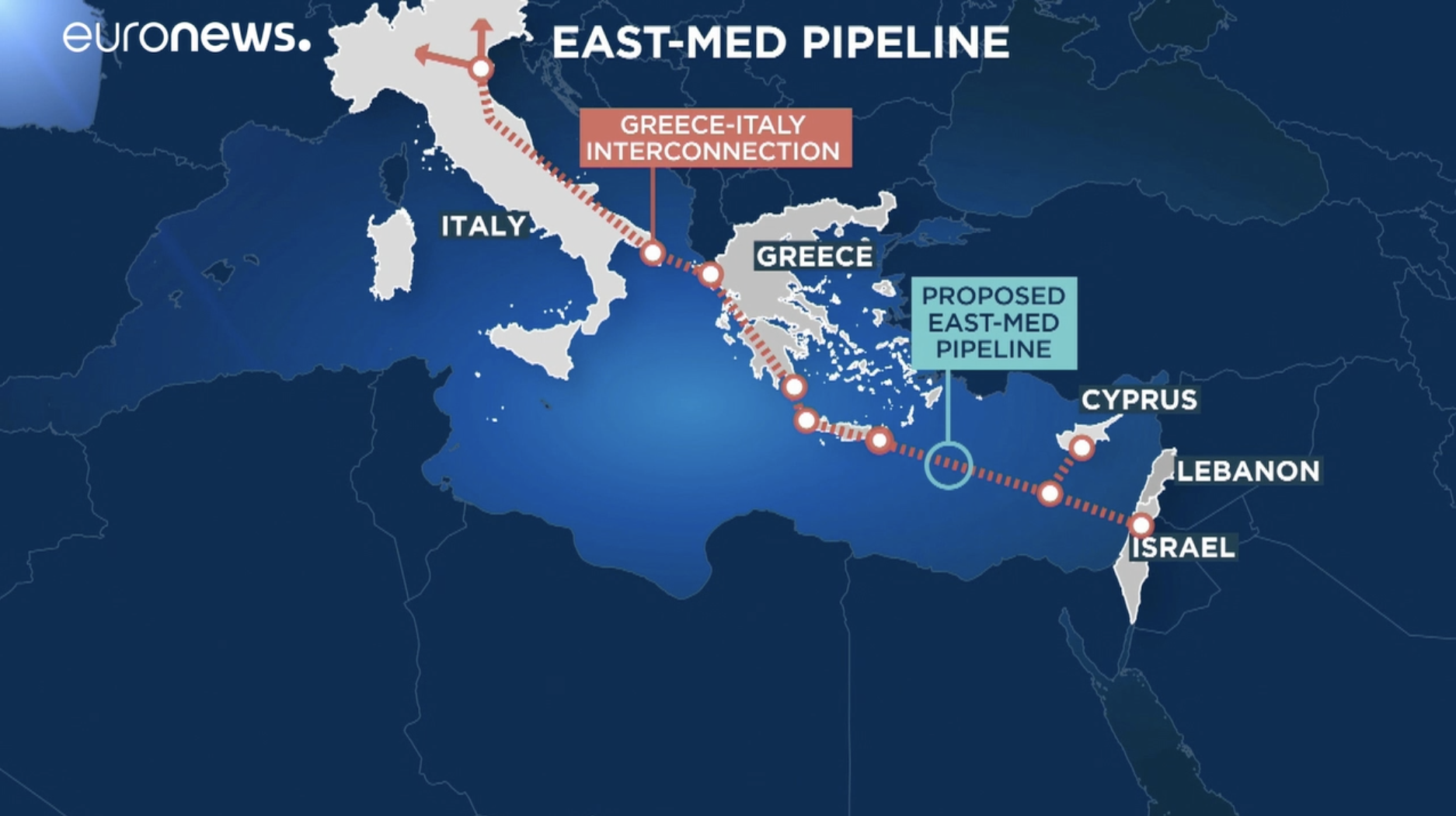President Biden is withdrawing U.S. support for the EastMed pipeline that would bring natural gas from Israel to the European continent. Europe is currently in an energy crisis with record prices for natural gas and electricity, potential rolling blackouts, low supplies of natural gas, millions of citizens in energy poverty and increasing coal consumption, which the continent has wanted to end. Increasing reliance on intermittent renewable sources that have not produced to their potential has put pressure on other sources the Europeans have discouraged. The result of Biden’s most recent decision is making Europe even more dependent on Russia for its natural gas. Currently, Western Europe gets over 40 percent of its natural gas from Russia via a pipeline that runs through Ukraine. Russia wants to activate its Nord Stream 2 pipeline that runs under the Baltic so that it can avoid the current route through Ukraine.
Biden gave Russia the go-ahead in July for the continued construction of Nord Stream 2, which Russia predicted could go on-line by the end of the year. Rather than helping an ally, Biden is helping Russia dominate Europe’s energy system and gain economic strength in doing so. The only explanation that Biden’s administration has given to withdrawing support is: “Washington’s interest is now switching to renewable energy sources.” While the White House is using its dogged support for the switch to renewable energy to justify its decision, the European Commission drafted legal text that pronounces natural gas and nuclear power as “transitional” green energy sources to be used to bridge countries away from coal toward technologies like wind and solar.
EastMed Gas Pipeline
The EastMed Gas pipeline is a 1,180-mile undersea pipeline project from Israel to southern Europe, set to be completed by 2025, which, when completed will ease Europe’s dependence on Russia and Turkey, which serves as a hub for oil and natural gas. The pipeline will reach depths of 3 kilometers, and have a capacity of 10 billion cubic meters per year. Construction of the pipeline is expected to cost approximately €6 billion ($6.86 billion). The pipeline is being developed by IGI Poseidon S.A., a 50-50 joint venture between the Greek gas utility DEPA and the Italian gas utility Edison. The EastMed Pipeline accord was signed in Athens by the leaders of Greece, Cyprus, and Israel on January 2, 2020.

Biden’s Political Decision
Biden is not only catering to Russia regarding the EastMed pipeline decision but also to Turkey, who is offended that it was left out of the EastMed pipeline accord. Turkey believes that it should be part of the pipeline project amid claims over natural gas in the east Mediterranean. Turkish president Erdogan declared that any future eastern Mediterranean “gas project must include Turkey. This business cannot be done without Turkey. Because if [gas] is to be transferred to Europe from here, it will only happen through Turkey.” According to an expert, the Biden administration is “attributing huge significance to Turkey,” and its future after Erdogan.
Biden’s Inconsistencies
MedEast is the second major pipeline that the Biden administration has put a damper on: the first being the Keystone XL pipeline that would bring oil from Canada and North Dakota to the Gulf States. Canadian oil is heavy oil needed for U.S. refineries that retooled decades ago when U.S. light oil production was declining. Keystone XL would also provide more oil to the United States from an ally rather than being dependent on OPEC and Russia for oil. For several months since the pandemic began, Russia was the number 2 supplier of oil to the United States, competing with Mexico for that distinction. When Biden blocked the Keystone XL pipeline by canceling its Presidential permit, he blocked a project that went over and above existing standards to address issues such as carbon emissions, safety standards, and cooperation with indigenous people impacted by the pipeline.
Biden’s Keystone XL and MedEast pronouncements both overturn decisions made by President Trump. When Joe Biden agreed to set aside U.S. objections to the controversial Russian undersea Nord Stream 2 pipeline, he reversed former President Trump’s policy of opposing the project due to security concerns. The 760-mile Baltic Sea pipeline allows direct Russian natural gas supply to Germany and other western European countries and allows Russia to dominate the European energy market, making Putin a power player in continental Europe, where Russia already supplies over 40 percent of its natural gas.
Conclusion
President Biden continues to overturn decisions made by President Trump regarding energy policy. In the most recent case, he has withdrawn U.S. support for the EastMed gas pipeline project, which would transport natural gas from Israel to Europe via the Mediterranean Sea when completed in 2025. The project would remove some of the continent’s dependency on Russia for natural gas supplies that Russia has used as a geopolitical tool at times in the past. Biden’s announced reasoning is that the focus in Washington is now on renewable energy, despite the European Commission seeing the necessity to allow natural gas to be deemed a “transitional green energy source”. Biden has shown huge inconsistency on his pipeline decisions, with one major exception—they all overturn decisions made by President Trump.



